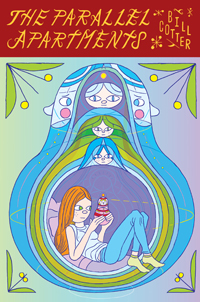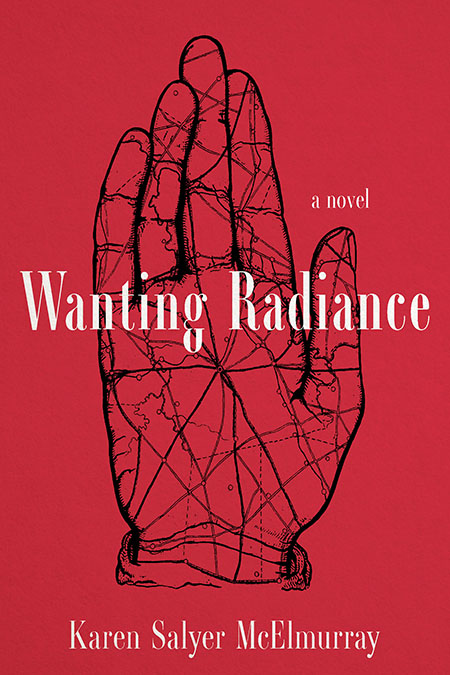Picking up the Pieces
In Bill Cotter’s Parallel Apartments, a cast of outcasts and misfits attempt to re-assemble their lives
Marcia Brodsky, a supporting character in Bill Cotter’s new novel, Parallel Apartments, has trouble with money and an unhealthy obsession with sex. She has accumulated $400,000 of credit-card debt, and when her parents die in quick succession, leaving her close to half a million dollars, her friends assume she’ll pay off her balances and start afresh. Marcia, though, thinks that such a crude use of her inheritance would dishonor her parents’ memory. Instead, she invests $400,000 in a physically perfect (and mechanically sophisticated) male sex robot and installs it in her rental home in Austin. Marcia reckons that scores of women (and men) will pay top dollar for satisfying sex without emotional complications or the risk of STDs or pregnancy.
 Cotter’s densely peopled novel is lousy with similarly outrageous events intended to provoke and titillate: middle-aged prostitutes give sex advice to teenagers, quack doctors peddle sham cures for AIDS, crooked cops exploit young women into sexual serfdom, and a professional woman “swives” 916 strangers from Craigslist in a desperate attempt to get pregnant. Beneath the sexual ickiness and banal grotesqueries, however, Parallel Apartments contains a series of morality tales about what happens when characters allow desires to intensify into necessities.
Cotter’s densely peopled novel is lousy with similarly outrageous events intended to provoke and titillate: middle-aged prostitutes give sex advice to teenagers, quack doctors peddle sham cures for AIDS, crooked cops exploit young women into sexual serfdom, and a professional woman “swives” 916 strangers from Craigslist in a desperate attempt to get pregnant. Beneath the sexual ickiness and banal grotesqueries, however, Parallel Apartments contains a series of morality tales about what happens when characters allow desires to intensify into necessities.
The novel orbits around three generations of Austin women whose lives are irrevocably altered by unplanned pregnancies. In 1951, at just thirteen, Charlotte gets knocked up by her boyfriend Lou, who is summarily transported to a bad-boy boarding school and does not return for eighteen years. Charlotte’s daughter Livia is married for only three days in 1969 before her rock-star husband dies tragically, leaving her bereft and pregnant herself.
Finally, Justine, the central character, runs away from Livia and Charlotte in 1988 before finishing high school and flees to New York, planning to work as a prostitute. Instead, she spends sixteen years as a quasi-concubine for Franklin, an ex-NYPD cop who periodically forces himself on Justine or attempts to compel her into three-ways with other wayward young women. She summons the energy to leave him in 2004 after she discovers that she is pregnant. Justine decides in a moment to return to Austin and decide what to do.
 Once in Austin, after weeks of holing up in a flea-bag motel notorious for being the site of a mass murder, Justine begins to venture out and quickly becomes acquainted with a diverse cast of misfits and outcasts who happen to have landed at the apartment complex that gives the novel its name. She begins a romantic affair with a Honduran guevedoche (look it up), and together they move into an efficiency a few doors down from a wannabe serial killer whose first attempts at homicide appear less like the Son of Sam and more like the Three Stooges. Other characters could generously be termed “eccentric”—at a minimum, they appear to be the fringe element of their town’s “Keep Austin Weird” mentality.
Once in Austin, after weeks of holing up in a flea-bag motel notorious for being the site of a mass murder, Justine begins to venture out and quickly becomes acquainted with a diverse cast of misfits and outcasts who happen to have landed at the apartment complex that gives the novel its name. She begins a romantic affair with a Honduran guevedoche (look it up), and together they move into an efficiency a few doors down from a wannabe serial killer whose first attempts at homicide appear less like the Son of Sam and more like the Three Stooges. Other characters could generously be termed “eccentric”—at a minimum, they appear to be the fringe element of their town’s “Keep Austin Weird” mentality.
While much of Parallel Apartments strains to shock its readers, in its quieter moments Cotter proves capable of fine perceptions and adept prose. He requires readers to keep a dictionary on hand, but his verbal opulence is rarely gratuitous; rather, it’s a natural expression of the complexity and contradictions that lie at the root of existence. At a moment of crisis, Justine realizes that she is too shallow and duplicitous to be truly suicidal: “She was a crybaby. She hated herself for her cowardice and hypocrisy, her virtuoso lies and simpleton’s guile, her purposeless body and borrowed curiosity, her weedy bromedliads of hair and putatively electrifying green eyes, which to her just looked like botulinal oysters.”
Cotter seems to prefer depicting behavior that is outrageous or merely absurd to portraying characters that are plausibly human, but even in his most preposterous scenes he provides moments of insight and comedy. His account of the tyro killer, Murphy, is superficially clichéd (at one point Murphy himself notes that his childhood contained three components that most serial killers have in common: “bed-wetting, animal-torturing, and fire-setting”), but the conventionality of that premise is outweighed by Murphy’s offbeat observations and loopy internal rants. He describes his boss as “a tyrannical, endomorphic blowhard glazed with Joycean spectacles and piled with a spongy meadow of black chest hairs so springy that they made his partly unbuttoned Hawaiian shirts float an inch above his skin. Whenever he moved, his chest hairs audibly tickled the polyester in crinkly tones, which, to Murphy, sounded just like what frying bacon would sound like if frying bacon could stage-whisper.”
The melodrama of Parallel Apartments verges upon the soap-operatic at times, but this novel remains a page-turner not for the resolution of its disparate plot lines but for the vitality of its prose. Bill Cotter has created a cast of vagabond souls whose illicit desires lead to irreparable damage, but the author renders them with such animation and sagacity that even their most egregious acts appear familiar and sympathetic. Parallel Apartments is not for the faint of heart (or the weak of stomach), but the verve of Cotter’s writing makes it worth the effort.
Bill Cotter will read from Parallel Apartments at Crosstown Arts in Memphis on March 18, 2014, at 6 p.m.


